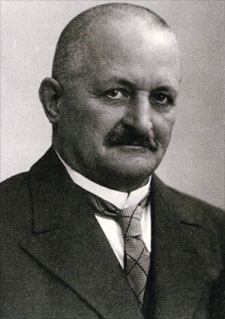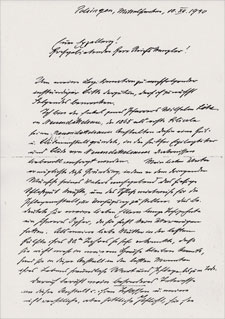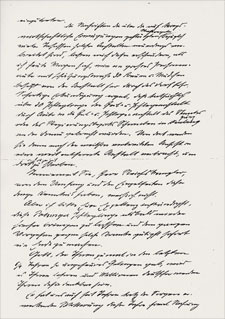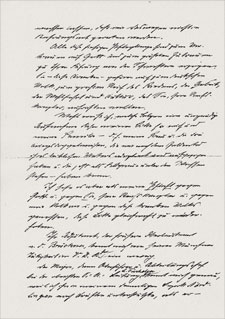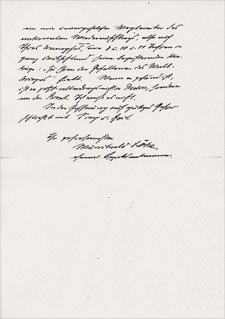Wunibald Löhe: Protest against Euthanasia
Retired senior civil servant Wunibald Löhe (1869–1945) ventured a particularly courageous step when the National Socialists took the majority of residents of the Neuendettelsau homes and asylums away to euthanasia centers and killed them their as part of their euthanasia program,.
Wunibald Löhe was a grandson of Wilhelm Löhe (1808–1872) who had founded the deaconess motherhouse in Neuendettelsau in 1854. Wunibald’s father Ferdinand Löhe owned the estate in Polsingen until its ownership was transferred to the Neuendettelsau Diaconal Ministry in 1903. Wunibald Löhe’s family had imbued him with strict Lutheran, German National and monarchist values.
After earning a degree in legal science, he became a civil servant of the Kingdom of Bavaria. During World War I, he worked as senior district civil servant in Stadtsteinach im Frankenwald. He was transferred to Bad Königshofen in 1919, before being made a senior civil servant and appointed head of Nördlingen district administration in 1921.
Wunibald Löhe was not fundamentally averse to National Socialism. He maintained contacts with party members, too, but had landed in conflict with local party officials in 1933. Voting in the mayoral election was tied and the National Socialists wanted to push through their candidate. Against the will of the district NSDAP leader, however, Löhe had lots drawn, as was stipulated by law in the event of a tie, and the opponent of the NSDAP won. As a result, the district leader requested Löhe’s dismissal. This did not happen, though, because a relative of Löhe’s intervened with Reich Governor Franz Ritter von Epp (1868–1946).
Since he had already sworn a civil servant’s oath to throne and altar earlier, Löhe decided to take early retirement rather than swear the oath of allegiance to Hitler required of civil servants in 1934. He then moved to Polsingen
He witnessed the removal of around thirty women and girls from the Neuendettelsau Institutions in Polsingen firsthand on the morning of December 10, 1940. Although he was aware that he was bringing his family and himself into serious danger, he protested in writing to Hitler that very same day and asked him to have the Polsingen charges brought back here again at once and to kindly put an end to the entire action against such people with illnesses immediately (C.-R. Müller and H.-L. Siemen, Warum sie sterben mussten, 85).
Löhe reasoned that his request was his duty to God and you Mr. Reich Chancellor and to my nation … and to these ill members of the German nation (C.-R. Müller and H.-L. Siemen, Warum sie sterben mussten, 85). The depth of the religious motivation behind Löhe’s protest became clear when a former schoolmate intercepted Löhe’s letter to Hitler in order to protect him and his family. The schoolmate informed him, I have destroyed your letter to Hitler. You can imagine what would have happened otherwise. A discussion of this issue with you is pointless, given your Christian views (W. Löhe, Bezirksamtmann, 20).
Löhe did not stop at a written protest to Hitler. He sabotaged a transport of people with illnesses in the spring of 1941: Upon learning that buses had driven up to Polsingen manor in order to pick up people with illnesses, he instructed the bus drivers to drive back immediately because no transports would be taking place that day. The bus drivers were surprised but followed his instructions. The buses had already left when the party officials in charge of the transport arrived and the action had to be postponed one week. It was possible to send several people with illnesses home during that week and thus save them from being killed. Although the local NSDAP group leader tried to find out who had sent the bus drivers away, no one bothered Löhe.
Source / title
- © Private collection of the Bölke family, Polsingen

